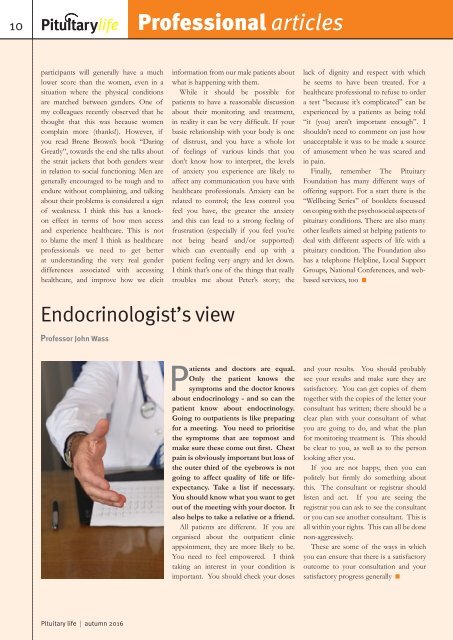Issue 34
You also want an ePaper? Increase the reach of your titles
YUMPU automatically turns print PDFs into web optimized ePapers that Google loves.
10 Professional articles<br />
participants will generally have a much<br />
lower score than the women, even in a<br />
situation where the physical conditions<br />
are matched between genders. One of<br />
my colleagues recently observed that he<br />
thought that this was because women<br />
complain more (thanks!). However, if<br />
you read Brene Brown’s book “Daring<br />
Greatly”, towards the end she talks about<br />
the strait jackets that both genders wear<br />
in relation to social functioning. Men are<br />
generally encouraged to be tough and to<br />
endure without complaining, and talking<br />
about their problems is considered a sign<br />
of weakness. I think this has a knockon<br />
effect in terms of how men access<br />
and experience healthcare. This is not<br />
to blame the men! I think as healthcare<br />
professionals we need to get better<br />
at understanding the very real gender<br />
differences associated with accessing<br />
healthcare, and improve how we elicit<br />
information from our male patients about<br />
what is happening with them.<br />
While it should be possible for<br />
patients to have a reasonable discussion<br />
about their monitoring and treatment,<br />
in reality it can be very difficult. If your<br />
basic relationship with your body is one<br />
of distrust, and you have a whole lot<br />
of feelings of various kinds that you<br />
don’t know how to interpret, the levels<br />
of anxiety you experience are likely to<br />
affect any communication you have with<br />
healthcare professionals. Anxiety can be<br />
related to control; the less control you<br />
feel you have, the greater the anxiety<br />
and this can lead to a strong feeling of<br />
frustration (especially if you feel you’re<br />
not being heard and/or supported)<br />
which can eventually end up with a<br />
patient feeling very angry and let down.<br />
I think that’s one of the things that really<br />
troubles me about Peter’s story; the<br />
lack of dignity and respect with which<br />
he seems to have been treated. For a<br />
healthcare professional to refuse to order<br />
a test “because it’s complicated” can be<br />
experienced by a patients as being told<br />
“it (you) aren’t important enough”. I<br />
shouldn’t need to comment on just how<br />
unacceptable it was to be made a source<br />
of amusement when he was scared and<br />
in pain.<br />
Finally, remember The Pituitary<br />
Foundation has many different ways of<br />
offering support. For a start there is the<br />
“Wellbeing Series” of booklets focussed<br />
on coping with the psychosocial aspects of<br />
pituitary conditions. There are also many<br />
other leaflets aimed at helping patients to<br />
deal with different aspects of life with a<br />
pituitary condition. The Foundation also<br />
has a telephone Helpline, Local Support<br />
Groups, National Conferences, and webbased<br />
services, too ■<br />
Endocrinologist’s view<br />
Professor John Wass<br />
Patients and doctors are equal.<br />
Only the patient knows the<br />
symptoms and the doctor knows<br />
about endocrinology - and so can the<br />
patient know about endocrinology.<br />
Going to outpatients is like preparing<br />
for a meeting. You need to prioritise<br />
the symptoms that are topmost and<br />
make sure these come out first. Chest<br />
pain is obviously important but loss of<br />
the outer third of the eyebrows is not<br />
going to affect quality of life or lifeexpectancy.<br />
Take a list if necessary.<br />
You should know what you want to get<br />
out of the meeting with your doctor. It<br />
also helps to take a relative or a friend.<br />
All patients are different. If you are<br />
organised about the outpatient clinic<br />
appointment, they are more likely to be.<br />
You need to feel empowered. I think<br />
taking an interest in your condition is<br />
important. You should check your doses<br />
and your results. You should probably<br />
see your results and make sure they are<br />
satisfactory. You can get copies of them<br />
together with the copies of the letter your<br />
consultant has written; there should be a<br />
clear plan with your consultant of what<br />
you are going to do, and what the plan<br />
for monitoring treatment is. This should<br />
be clear to you, as well as to the person<br />
looking after you.<br />
If you are not happy, then you can<br />
politely but firmly do something about<br />
this. The consultant or registrar should<br />
listen and act. If you are seeing the<br />
registrar you can ask to see the consultant<br />
or you can see another consultant. This is<br />
all within your rights. This can all be done<br />
non-aggressively.<br />
These are some of the ways in which<br />
you can ensure that there is a satisfactory<br />
outcome to your consultation and your<br />
satisfactory progress generally ■<br />
Pituitary life | autumn 2016
















